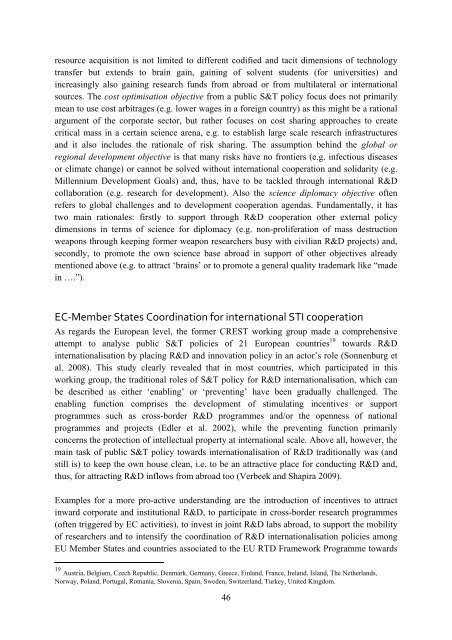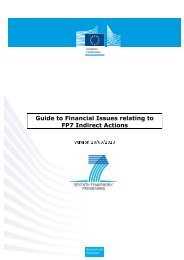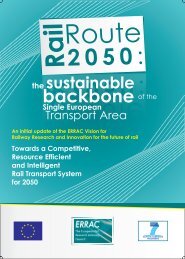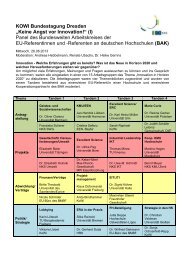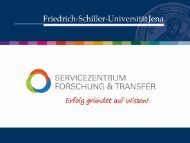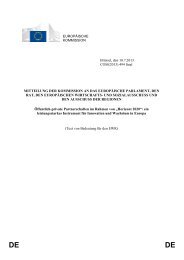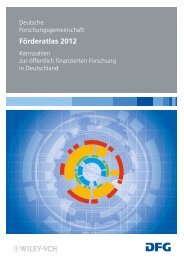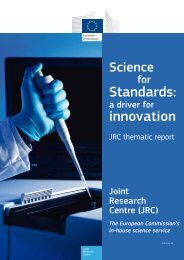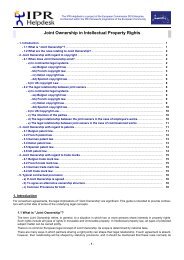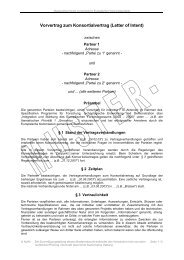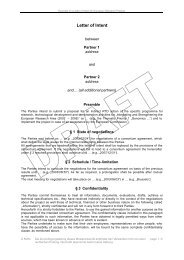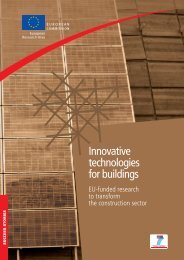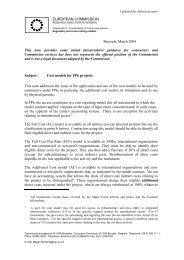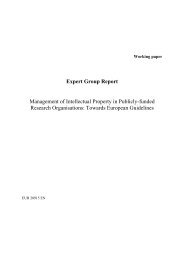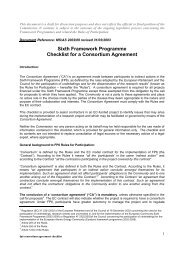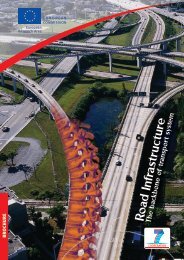Draft Report of the Expert Group on International STI Cooperation to ...
Draft Report of the Expert Group on International STI Cooperation to ...
Draft Report of the Expert Group on International STI Cooperation to ...
You also want an ePaper? Increase the reach of your titles
YUMPU automatically turns print PDFs into web optimized ePapers that Google loves.
esource acquisiti<strong>on</strong> is not limited <strong>to</strong> different codified and tacit dimensi<strong>on</strong>s <str<strong>on</strong>g>of</str<strong>on</strong>g> technology<br />
transfer but extends <strong>to</strong> brain gain, gaining <str<strong>on</strong>g>of</str<strong>on</strong>g> solvent students (for universities) and<br />
increasingly also gaining research funds from abroad or from multilateral or internati<strong>on</strong>al<br />
sources. The cost optimisati<strong>on</strong> objective from a public S&T policy focus does not primarily<br />
mean <strong>to</strong> use cost arbitrages (e.g. lower wages in a foreign country) as this might be a rati<strong>on</strong>al<br />
argument <str<strong>on</strong>g>of</str<strong>on</strong>g> <str<strong>on</strong>g>the</str<strong>on</strong>g> corporate sec<strong>to</strong>r, but ra<str<strong>on</strong>g>the</str<strong>on</strong>g>r focuses <strong>on</strong> cost sharing approaches <strong>to</strong> create<br />
critical mass in a certain science arena, e.g. <strong>to</strong> establish large scale research infrastructures<br />
and it also includes <str<strong>on</strong>g>the</str<strong>on</strong>g> rati<strong>on</strong>ale <str<strong>on</strong>g>of</str<strong>on</strong>g> risk sharing. The assumpti<strong>on</strong> behind <str<strong>on</strong>g>the</str<strong>on</strong>g> global or<br />
regi<strong>on</strong>al development objective is that many risks have no fr<strong>on</strong>tiers (e.g. infectious diseases<br />
or climate change) or cannot be solved without internati<strong>on</strong>al cooperati<strong>on</strong> and solidarity (e.g.<br />
Millennium Development Goals) and, thus, have <strong>to</strong> be tackled through internati<strong>on</strong>al R&D<br />
collaborati<strong>on</strong> (e.g. research for development). Also <str<strong>on</strong>g>the</str<strong>on</strong>g> science diplomacy objective <str<strong>on</strong>g>of</str<strong>on</strong>g>ten<br />
refers <strong>to</strong> global challenges and <strong>to</strong> development cooperati<strong>on</strong> agendas. Fundamentally, it has<br />
two main rati<strong>on</strong>ales: firstly <strong>to</strong> support through R&D cooperati<strong>on</strong> o<str<strong>on</strong>g>the</str<strong>on</strong>g>r external policy<br />
dimensi<strong>on</strong>s in terms <str<strong>on</strong>g>of</str<strong>on</strong>g> science for diplomacy (e.g. n<strong>on</strong>-proliferati<strong>on</strong> <str<strong>on</strong>g>of</str<strong>on</strong>g> mass destructi<strong>on</strong><br />
weap<strong>on</strong>s through keeping former weap<strong>on</strong> researchers busy with civilian R&D projects) and,<br />
sec<strong>on</strong>dly, <strong>to</strong> promote <str<strong>on</strong>g>the</str<strong>on</strong>g> own science base abroad in support <str<strong>on</strong>g>of</str<strong>on</strong>g> o<str<strong>on</strong>g>the</str<strong>on</strong>g>r objectives already<br />
menti<strong>on</strong>ed above (e.g. <strong>to</strong> attract ‘brains’ or <strong>to</strong> promote a general quality trademark like “made<br />
in ….”).<br />
EC-Member States Coordinati<strong>on</strong> for internati<strong>on</strong>al <strong>STI</strong> cooperati<strong>on</strong><br />
As regards <str<strong>on</strong>g>the</str<strong>on</strong>g> European level, <str<strong>on</strong>g>the</str<strong>on</strong>g> former CREST working group made a comprehensive<br />
attempt <strong>to</strong> analyse public S&T policies <str<strong>on</strong>g>of</str<strong>on</strong>g> 21 European countries 19 <strong>to</strong>wards R&D<br />
internati<strong>on</strong>alisati<strong>on</strong> by placing R&D and innovati<strong>on</strong> policy in an ac<strong>to</strong>r’s role (S<strong>on</strong>nenburg et<br />
al. 2008). This study clearly revealed that in most countries, which participated in this<br />
working group, <str<strong>on</strong>g>the</str<strong>on</strong>g> traditi<strong>on</strong>al roles <str<strong>on</strong>g>of</str<strong>on</strong>g> S&T policy for R&D internati<strong>on</strong>alisati<strong>on</strong>, which can<br />
be described as ei<str<strong>on</strong>g>the</str<strong>on</strong>g>r ‘enabling’ or ‘preventing’ have been gradually challenged. The<br />
enabling functi<strong>on</strong> comprises <str<strong>on</strong>g>the</str<strong>on</strong>g> development <str<strong>on</strong>g>of</str<strong>on</strong>g> stimulating incentives or support<br />
programmes such as cross-border R&D programmes and/or <str<strong>on</strong>g>the</str<strong>on</strong>g> openness <str<strong>on</strong>g>of</str<strong>on</strong>g> nati<strong>on</strong>al<br />
programmes and projects (Edler et al. 2002), while <str<strong>on</strong>g>the</str<strong>on</strong>g> preventing functi<strong>on</strong> primarily<br />
c<strong>on</strong>cerns <str<strong>on</strong>g>the</str<strong>on</strong>g> protecti<strong>on</strong> <str<strong>on</strong>g>of</str<strong>on</strong>g> intellectual property at internati<strong>on</strong>al scale. Above all, however, <str<strong>on</strong>g>the</str<strong>on</strong>g><br />
main task <str<strong>on</strong>g>of</str<strong>on</strong>g> public S&T policy <strong>to</strong>wards internati<strong>on</strong>alisati<strong>on</strong> <str<strong>on</strong>g>of</str<strong>on</strong>g> R&D traditi<strong>on</strong>ally was (and<br />
still is) <strong>to</strong> keep <str<strong>on</strong>g>the</str<strong>on</strong>g> own house clean, i.e. <strong>to</strong> be an attractive place for c<strong>on</strong>ducting R&D and,<br />
thus, for attracting R&D inflows from abroad <strong>to</strong>o (Verbeek and Shapira 2009).<br />
Examples for a more pro-active understanding are <str<strong>on</strong>g>the</str<strong>on</strong>g> introducti<strong>on</strong> <str<strong>on</strong>g>of</str<strong>on</strong>g> incentives <strong>to</strong> attract<br />
inward corporate and instituti<strong>on</strong>al R&D, <strong>to</strong> participate in cross-border research programmes<br />
(<str<strong>on</strong>g>of</str<strong>on</strong>g>ten triggered by EC activities), <strong>to</strong> invest in joint R&D labs abroad, <strong>to</strong> support <str<strong>on</strong>g>the</str<strong>on</strong>g> mobility<br />
<str<strong>on</strong>g>of</str<strong>on</strong>g> researchers and <strong>to</strong> intensify <str<strong>on</strong>g>the</str<strong>on</strong>g> coordinati<strong>on</strong> <str<strong>on</strong>g>of</str<strong>on</strong>g> R&D internati<strong>on</strong>alisati<strong>on</strong> policies am<strong>on</strong>g<br />
EU Member States and countries associated <strong>to</strong> <str<strong>on</strong>g>the</str<strong>on</strong>g> EU RTD Framework Programme <strong>to</strong>wards<br />
19 Austria, Belgium, Czech Republic, Denmark, Germany, Greece, Finland, France, Ireland, Island, The Ne<str<strong>on</strong>g>the</str<strong>on</strong>g>rlands,<br />
Norway, Poland, Portugal, Romania, Slovenia, Spain, Sweden, Switzerland, Turkey, United Kingdom.<br />
46


